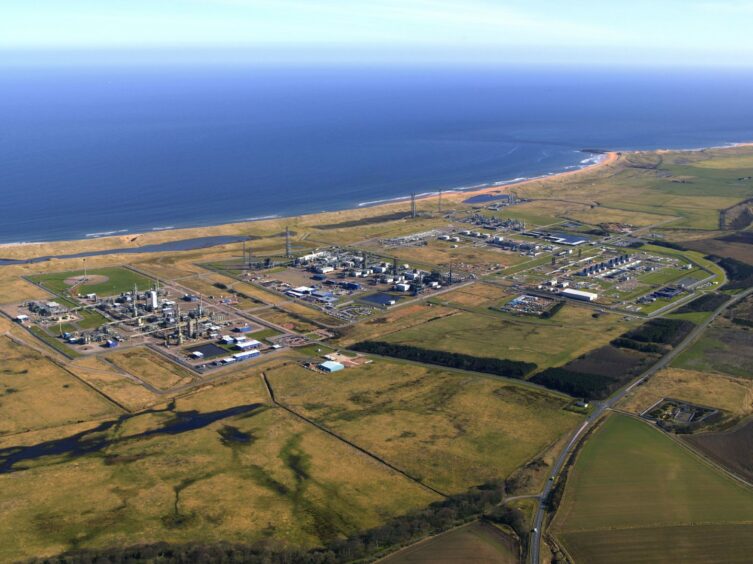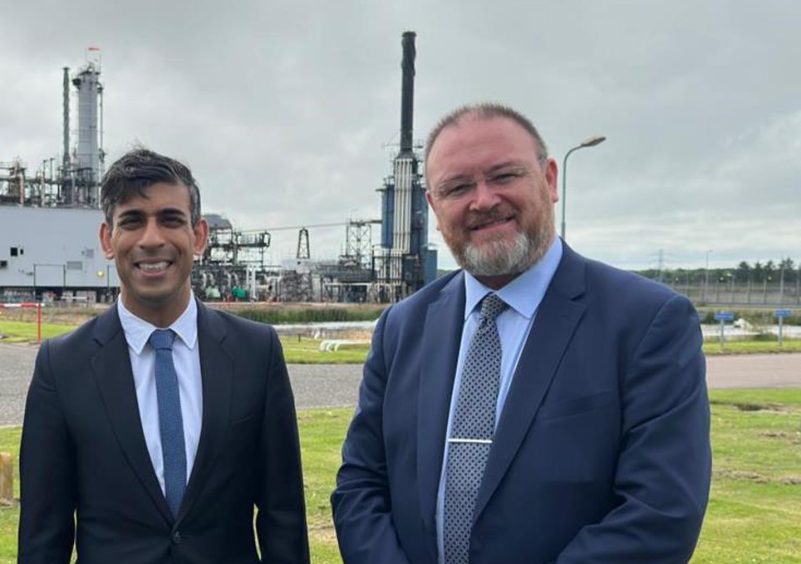
The Scottish Government has not allocated any Budget funding to carbon capture, utilisation and storage (CCUS), blaming ongoing questions over the timing of Westminster support.
It comes despite the ruling SNP’s longstanding £80 million pledge to support CCUS in Scotland, which currently hosts one planned project in the form of the northeast’s Acorn scheme.
The Scottish Government has argued greater clarity on business models – under UK Government remit – is needed to deliver the support, but opponents say Holyrood is “kicking the can down the road”.
Acorn CCUS funding
Based at the St Fergus gas terminal, Acorn is the backbone of the “Scottish Cluster” and seen as vital for Scotland and the wider UK to reach its net zero targets, but lost out in the “Track 1” entry process for a £1 billion support package from Westminster in 2021.
It was later confirmed this year as one of a pair of winners in the “Track 2” process, and given formal backing by Prime Minister Rishi Sunak during a visit to the region in summer.
Long before the project was given the go-ahead, the SNP had earmarked £80m to support acceleration of the scheme. But it later emerged the cash was “reprofiled” into subsequent years following delays to the Track delivery process.
Tuesday’s Scottish Budget announcement for 2024-25 takes a similar stance, with the government stating: “Due to uncertainty from the UK Government on the timescales for Track 2 CCUS support, no budget provision has been provided for this financial year.”
Despite this, Holyrood says it remains committed to supporting “the project” – assumed to be Acorn – with the £80m in capital funding to be provided at “the earliest opportunity.”
Energy Secretary Neil Gray told Energy Voice: “As set out in this week’s Budget, we remain committed to supporting the Scottish Cluster project with up to £80 million of Scottish Government capital funding. This funding was always intended to be delivered in a multi-year format.
“However, until Track-2 projects get the details they need from the UK Government to finalise delivery and funding plans, it is simply not possible to ascertain or predict how, or when, Scottish Government funding would best serve the project.
“We continue to engage with the project and I urge the UK Government to set out further details of the Track-2 scheme as a matter of urgency.”
Acorn is backed by a consortium of firms, including carbon storage developer Storegga (30%), as well as Shell and Harbour Energy (30% each), with the remaining 10% held by North Sea Midstream Partners.
The announcement came just hours before the unveiling of a “CCUS Vision”, in which the Department for Energy Security and Net Zero confirmed it had begun “initial engagement” with the Acorn and Viking transport and storage operators.
In early 2024 it said it intends to ask developers of both schemes to submit plans for assessment of an ‘anchor phase’ of initial capture projects, provisionally targeting deployment from 2028-2029.
‘Kicking the can’
However, Banff and Buchan Conservative MP David Duguid accused the Scottish government of “kicking the can down the road” by withholding support.
“SNP ministers originally refused to release the £80 million until Acorn was given Track 2 status which was announced by Rishi Sunak who visited St Fergus in August,” he said.
“But this budget omission has exposed the SNP for what they really are as they now try to kick the can down the road with a different excuse for not investing in the Scottish Cluster.
“Storegga has been developing the project for years and plans to have it operational by 2027 so that £80 million should have been released well before now.
“In addition to the award of Track 2, the UK Government has included Acorn in a £20bn government support package, already released more than £40 million directly to the Scottish Cluster itself and awarded new carbon storage licences for Acorn East.
“This has all been done while the SNP Government refuse to include any funding for CCUS in their budget and want nothing more than to create grievance, uncertainty and put investors off for their own political purposes.”
Philippa Parmiter, chief executive of Scottish decarbonisation trade body NECCUS said: “The CCUS sector is a nascent industry which needs governmental support to get off the ground.
“Through our engagement with both the UK and Scottish Governments, representing our members, we are confident that both see the importance of CCUS in the overall strategy to get to net zero.”
Energy transition cuts
Meanwhile, budget documents also note the administration will “continue to promote industrial decarbonisation across the economy”, in support of a just transition for the energy sector, including support for businesses in the north east to grow and diversify.
In particular, the budget points to the nearly £67m to be issued from government, enterprise agencies and the Scottish National Investment Bank to “kickstart” the £500m investment fund for the offshore wind supply chain. Disbursed over five years, the funding is aimed at garnering further private capital for ports, manufacturing and assembly work.
This will come in tandem with “early-stage investment” in hydrogen innovation, along with other technologies such as tidal and wave.
However, funds marked specifically for “energy transition” will see cuts of over £33m in the 2024-25 budget.
Russell Borthwick, chief executive of Aberdeen & Grampian Chamber of Commerce criticised the cuts, in particular reductions to the Just Transition fund.
“The challenge of the energy transition has been exacerbated by the Scottish Government’s needless presumption against oil and gas, which is why we want to see the Just Transition Fund doubled to deliver £1bn of investment over 10 years,” he said.
“Instead, annual spending on the fund is reducing to just £12.2million from next year. There is money in here for supporting the offshore wind supply chain, but a real question mark over whether the scale of the funding is enough to make a meaningful difference.”
Mr Gray said: “While faced with one of the most difficult financial settlements since devolution, with real terms cuts to our block grant from the UK Government, we are making the most of every resource available in the Scottish 2024/2025 Budget to continue to grow and transform the economy. This includes supporting a just transition for our energy sector and seizing the enormous benefits our net zero journey present.
“The Scottish Government’s financial investment across the Energy Transition and Offshore Wind Supply Chain will increase next year, with strategic investment of nearly £67m in Offshore Wind to stimulate and support private investment in the infrastructure and supply chain critical to the growth of the sector. It will also support market certainty, providing thousands of new jobs, embedding innovation and boosting skills.
“Alongside this, we will invest £45m in supporting industrial decarbonisation while helping businesses in the north-east and beyond continue to innovate and diversify, with continuing support across tidal, wave and hydrogen technologies.”
Recommended for you

 © Supplied by Scottish Conservativ
© Supplied by Scottish Conservativ